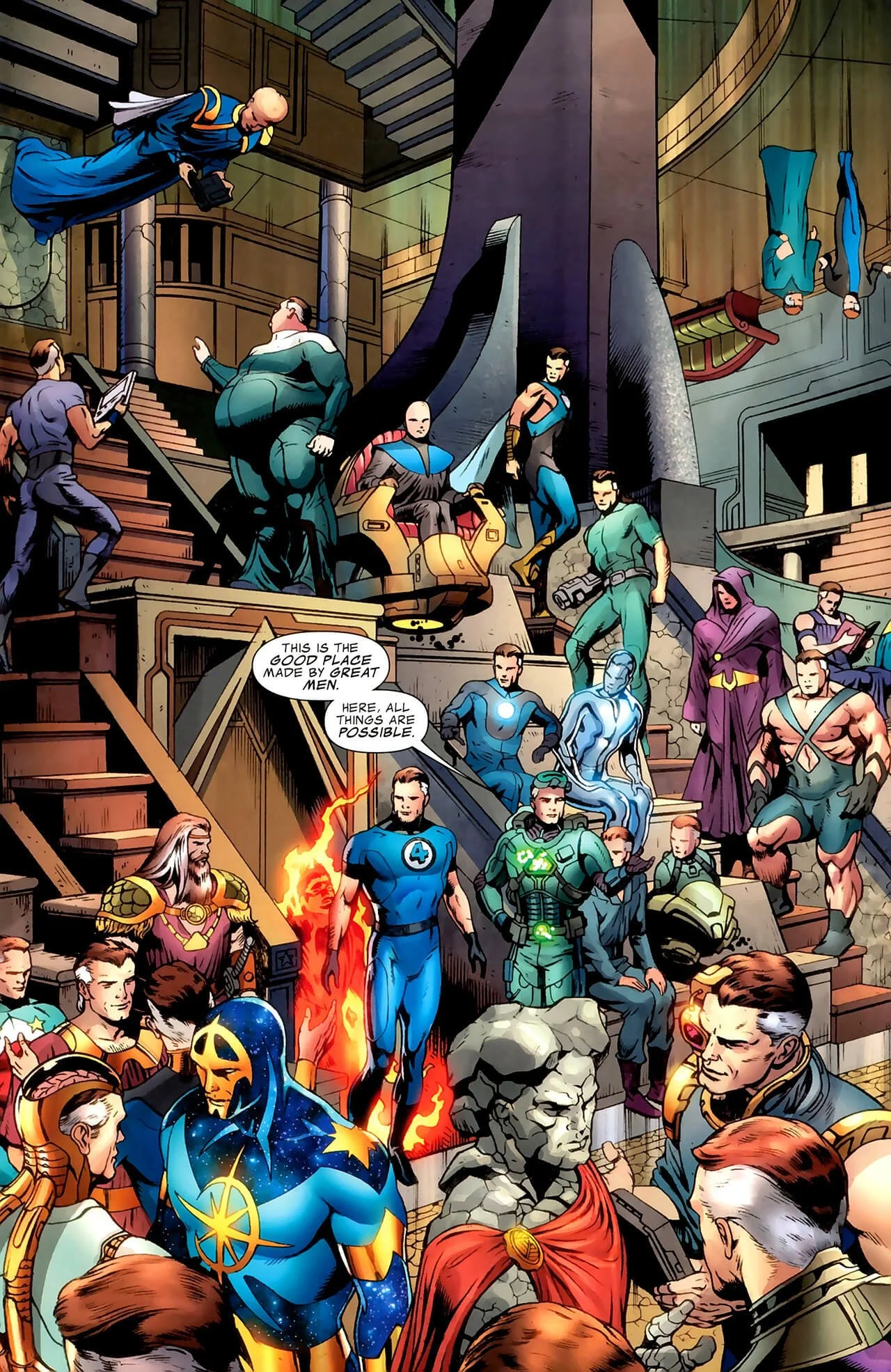Buy Marvel Back Issues from The Comic Crush. Catch up with the rest of our Guide To The Fantastic Four here.
Writer: Jonathan Hickman Pencillers: Dale Eaglesham (#570-#572, #575-#578) Neil Edwards (#573-#574) Inkers: Eaglesham (#570-#572, #575-#578) Andrew Currie (#573-#574) Colour Artist: Paul Mounts Letterers: VC’s Rus Wooton (#570, #572-#578) VC’s Clayton Cowles (#571) Collects: Fantastic Four (2009) #570-#578 Marvel via Panini / TP
Review by Paul Dunne
2nd August 2023 (Released 1st July 2023)
The Pitch: Solve everything! Inside a room kept secret from even his closest friends and family, Reed Richards had scrawled upon the walls 100 of the biggest and boldest ideas his brain could produce. And, recently, he added a 101st, the most audacious ever: 'Solve everything.' It would be a mantra that would lead the obsessively intellectual Mr. Fantastic to do great works on behalf of humanity - and, in typically fantastic fashion, lead him into even greater trouble! For, as the big brain of the Fantastic Four will find out, solving everything carries with it a great cost and one that is perhaps too much to pay.
Where do you go after the huge scope and big-budget movie stylings of Mark Millar and Bryan Hitch for Fantastic Four? It's a tough one. This could easily have been an example of the 'one good run, one bad run' curse that sometimes pervades comics. Marvel's editors had ideas, though... they wanted, apparently, to skew younger. Although Hickman was only three years Millar's junior back then. He still is. I've done the research, mate. Hickman, at this point, had already revitalised The Avengers and begun his great, over-reaching Marvel experiment, taking the interconnectedness of New York's superhero squads and really running with it, rolling it all into one huge tapestry of spandex, and by all accounts, beautifully so. I keep missing the periods when this stuff is available in reasonably priced trades, so it's fantastic (pun intended, I'm a basic bitch), to see this back in print from Panini, having formerly been published as part of Marvel's Fantastic Four by Jonathan Hickman Complete Collection. If nothing else, I can finally crack open the volume two of that series. So what do Hickman and Eaglesham bring to the First Family? It's funny but the first thing you notice isn't the writing. It's Eaglesham's interpretation of Reed. We get a beefier Mr. Fantastic harking back to the Heroes Return era a decade earlier. It's an interesting approach, considering how slight he's been portrayed in Hitch's version.
Turning on the great machine: Hickaman asking questions of himself.
But beneath the skin, Reed is still an optimistic egghead. His password for his home lab affirms Hickman's approach to the FF and Reed's approach to life: There is always hope. Reed wants a world where hope isn't an indulgence or a last resort, but the norm. To that end, he switches on the great machine and meets himself, multiple versions of himself, in fact. Doubtless, the secret society of multiple Reed Richards appeals to Reed's ego. We see him falling prey to one of the great problems of great minds: distraction. He hops through the Multiverse, solving problems on every world but his own, studying the Council of Reeds Richards, one of whom eventually takes on Celestial. A fool’s errand, fuelled by their egos just as the Celestial demand to rule the council, is fuelled by their own egos. Yet at the heart of this lies exploration and the need to break through barriers. Both the council of infinite Reed Richards and the Celestials go against the 616 Reed's core principles. They feel that exploration is to conquer. When they find multiple Multiversal Doctor Dooms, they disable, render his intellect null and void, make him less than the man he was and by doing so, drive his conquering nature from him. Reed 616 wants something different...
If it ain’t broke… (family dynamics).
Rehabilitation. He wants the man before Doom to resurface. Perhaps naively, after all, we all know Doom toots as he pleases! As the book's second half begins to unfold, so do more themes. Whereas Millar was concerned about what happens after the end comes, Hickman has a more singular idea driving his universe: Evolution. One that will eventually lead to the destruction of all the Marvel Universes, but here indicates making the world better... Solving everything. As much as Reed wants the world to evolve, he sometimes misses the people he loves evolving around him. Franklin's ability to give birth to entire universes starts here, in a relatively minor moment... and is never mentioned again in this volume. Valeria's intellect grows to a size that will one day consume her father's... One of Hickman's abilities is not to dwell on the past of The FF, but to use it as a springboard for greater things. We touch on enemies and places we've seen before. The Mole Man, whose ambitions have changed - evolved - into something more peaceful. Atlantis also gets a massive rethink, putting the much-maligned and sidelined Sue Storm Richards at the forefront of the future. Sue steps forward to represent the entirety of Mankind to the original races of Atlantis, her previous involvement with Namor a help rather than a hindrance or inflection point for damage to her marriage with Reed. Johnny Storm is still a preening ponce, though, rubbing Ben up the wrong way every chance he gets. Hey, if ain't broke...
Infinite Reeds.
Hickman paces the arcs in this first volume nicely. He makes the FF accessible again. Like a good scientist, he's willing to make bold experiments. The changes the world irrevocably (at least until the next writer comes on) and in huge ways, something that would make his Hox / Pox reboot so ground-breaking. His writing does what good, long-form comic writing should do and makes you excited for the future (foundation). Eaglesham's hot-dad Mister Fantastic takes some getting used to, but every artist needs to bring something new, something challenging, especially when they're taking on well-established characters. His art recalls the sculpted look of Don Lawrence (who also drew great explorers and people building futures on strange worlds). His co-penciller, Neil Edwards has a cleaner line, closer to Hitch's, which bridges the gap between Eaglesham's textured pencils and the worlds we left behind in Millar's run. Currie inks Eaglesham nicely, adding a nice depth and weight to his lines. Mounts' colours are in keeping with the real world-but-weird science tones that really work for the FF. Wooton and Cowles give resonance to the words and voices on the book. You feel the desperation and arrogance of Mole Man, the awe in Reed's voice as he sees the impossible for the first time and computes the finer points faster than most processors. This would have been the run that created a bright future for The FF and ultimately, for the whole Marvel Universe. The run that solved... everything!
Fantastic Four: Solve Everything Omnibus is available at your local comic shop now.





